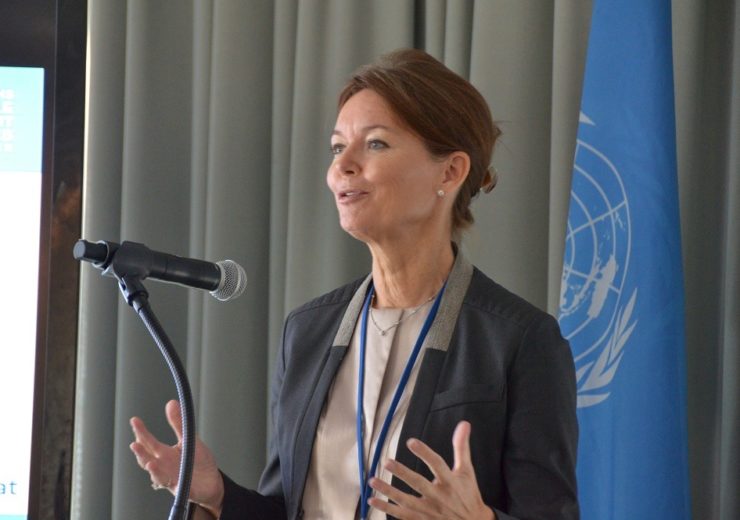Lise Kingo, CEO of UN Global Compact, talks to CEO Journal editor Stephen Hall about the importance of corporate social responsibility and the benefits this can bring to both the world and businesses' bottom lines

Lise Kingo, UN Global Compact CEO
The UN Global Compact was initiated to bridge a gap between business and the United Nations and is now the world’s largest corporate social responsibility (CSR) initiative, charged with implementing 17 sustainable development goals and has over 13,000 industry participants. Lise Kingo was appointed as CEO in 2015. She tells CEO Journal editor Stephen Hall why she’s passionate about CSR and why companies that join the UN Global Compact regularly outperform their peers.
In 1999, Kofi Annan, former Secretary General of the UN, addressed a packed room of delegates at the World Economic Forum in Davos.
“I propose that you, the business leaders, and we, the United Nations, initiate a global compact of shared values and principles which will give a human face to the global market,” he said.
Mighty oak trees from little acorns grow. It was this speech that laid the foundations for the creation of the world’s largest corporate social sustainability initiative, which now includes 13,000 business participants and other stakeholders in over 170 countries.
What is the UN Global Compact?
The UN Global Compact runs on a set of 10 core principles, and at the forefront of these is a robust focus on justice and fairness. The wheels were set in motion when in 1948, out of the desolation of World War II, the newly formed United Nations agreed to implement a set of standards for universal human rights.
The organisation is now fighting on a number of different fronts. Income inequality prevails. Although rates of extreme poverty have fallen since 1990, the richest 1% own as much as the bottom 50%, and 10% of the population still live on less than $1.90 per day.
According to research from the World Economic Forum, it will take 202 years to close the gender pay gap. Elsewhere, we stand at a crucial phase in history, with climate change predictions growing ever more apocalyptic unless urgent action is taken.
To tackle these pressing issues, 17 sustainable development goals were set up by the Compact, focusing on clean water and sanitation, zero hunger, climate change and gender equality; with a target of 2030 for these aims to be achieved.
Lise Kingo arrives at UN Global Compact
Lise Kingo, CEO of the organisation, has a lot of work on her hands, then. Not that the self-proclaimed optimist seems downhearted about the substantial list of tasks ahead.

In 2015, then UN Secretary General Ban Ki-Moon selected the Dane to lead the initiative, and the leader has brought a wealth of experience to the role. After gaining two Bachelor of Arts degrees and a Bachelor of Commerce in Denmark, Kingo went on to study for a Master’s degree in the UK.
She joined Novo Nordisk, the world’s largest producer of insulin, in 1988 and during a 26-year career at the business she implemented a number of socially responsible strategies which are still being maintained by the organisation today.
“I was an executive vice-president, chief of staff and member of the executive management board at Novo Nordisk, and through all of my years working, I have always had a passion for sustainable and responsible business,” says Kingo.
“I basically pioneered this whole topic and approach both in Novo Science and Novo Nordisk, so I have extensive experience in how to do this, and also in dealing with some of the dilemmas and problems that come with trying to combine a focused business agenda with a responsible business agenda.
“My belief is that the most successful companies are the ones that respond to this, as it’s the most successful way of running a company.”
Promoting socially responsible business
Indeed, socially responsible corporations have been found to have a 7% higher return on equity than other companies. Global Compact businesses outperform their peers in terms of corporate governance, while 22% score higher on human rights and labour rights.
According to research from the Boston Consulting Group, firms within the Compact also have a higher market valuation and better credit worthiness.
“I think the numbers speak for themselves, but there are also other arguments why companies should choose a responsible approach to doing business,” she says.
“One of them is employee engagement; being able to attract young people to come and work for companies and also the reputation of the business. There are various reputational studies and they clearly show that the best way for corporations to build trust and better reputations is to show that they are for good in the world.
“The best way to do that is to have a solid approach to the environment, to human rights, to anti-corruption, to labour issues, which are the ten principles that the Global Compact is building on.”
The global corporate responsibility trend
Kingo has been busily building a number of ambitious projects over the last few years. Alongside the Global Compact’s 71 local networks, she has helped implement the organisation’s ‘making global goals local business’ campaign.
The project has been running for three years, aiming to make every single company aware of the goals as a powerful target for transformation on a grand scale.
“I’m very proud that, at a global level, 80% of our companies are already taking action on the goals.
“I’m also very proud that we’ve been able to launch very successful initiatives on how to finance these goals, because the cruel reality is that the world needs $2.5 trillion every year to make them a reality and much of this funding will have to come from the private sector. So, we need many more companies to integrate their goals globally.”
Companies like Blackrock, JPMorgan and BNY Mellon are now using the UN Global Compact 10 principles to screen the companies that their clients are interested in investing in.

Furthermore, when Goldman Sachs asked a large group of their millennial workforce about the kind of organisations they would like to become involved with, the overwhelming response was ‘responsible ones’.
Looking ahead over the next 5-10 years, Kingo now believes that 30% of wealthy clients worldwide will seek out socially aware businesses when making commercial decisions.
“Hopefully even more will be looking for responsible companies to invest in and I think this is an incredible, powerful driver to make responsible business the mainstream way of running a company,” she says.
The drive towards CSR is a trend that is growing at pace. A recent study from Oxford University found that more than 80% of mainstream investors now consider environmental, social and governance data when choosing which projects to finance.
Globally, there are currently $22.89 trillion in assets being managed professionally under CSR investment strategies, an increase of 25% since 2014.
“I have been part of the sustainable business agenda for close to 30 years and I have never seen the kind of business engagements that we are seeing today, nor the kind of collective action from governments, businesses and stakeholders,” Kingo adds.
Lise Kingo on holding business to account
As more companies commit to collective action, the Compact has implemented a number of practices to hold the companies under its remit to account.
The UN Global Compact requires its network of businesses to submit records once a year, for example. This allows the organisation to measure how they are making progress on the environment, climate, human rights, labour, anti-corruption and the global goals.
The UN also delists organisations that don’t report and has removed more than 6,000 companies. Kingo reveals that the Compact has now accumulated 20,000 records and puts all of these on the website so that they are transparent to everyone.
“This combination of pressure for information by the financial community and also from other stakeholders, like employees and people that might want to come and work for the business, are all creating an incentive for companies to both take action and record in a proper way,” she explains.
“The new trend we are seeing is that companies integrate the ten principles and their set of goals in their business strategy. So their sustainability strategy becomes their business strategy, not the other way round.
“If you ask me how a company will look in the future, it’s a company that has a fully integrated responsible business strategy. In my view, more investors are going to ask for this because they need to rate firms to find out if they can put them into their sustainable product offerings or not.”
CEOs must lead the way on corporate social responsibility
And she is resolute that it is CEOs who must take the lead on pushing a robust CSR strategy. An annual progress report study by the UN Global Compact discovered that 68% of businesses rely on their CEO to set the agenda.
To help these leaders on their journey, the organisation set up an academy to offer training and inspiration to companies across the world on anything from climate to gender to supply chain management, and on how to address the 17 global goals.
Looking forward, Kingo now hopes that more chief executives will rethink their business models to make sure that their organisation is firmly aligned not only with the changing expectations of their customers but also with the future of the world.
“What we need to see now is many more companies getting on board and we need to see bigger scale,” she concludes.
“We have the 17 goals as a common blueprint and as a common lighthouse for the future. So, we all know what to do now, but we need to remember we don’t have a planet B.”
This article originally appeared in the summer 2019 edition of CEO Journal. The full issue can be viewed here.


